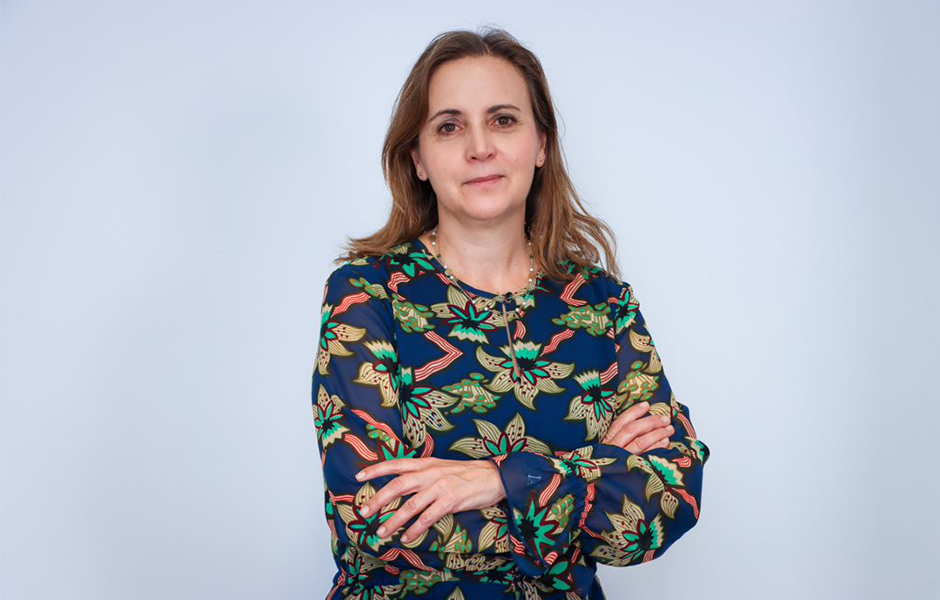Elisabete Martins is a researcher of the CardioCare – Cardiovascular Sciences research group of CINTESIS, at the Faculty of Medicine of the University of Porto (FMUP), where she is an Assistant Professor with Agregação. In April this year, she was chosen to coordinate the Heart Failure Study Group of the Portuguese Society of Cardiology (SPC). An election that is also the recognition of the work she has developed in recent decades in this area.
She was born in Porto, in 1972. As a child she wanted to be a veterinarian, but chose to be a doctor. She entered the Faculty of Medicine at the University of Porto in 1990, and finished her degree in 1996. She started teaching when she was an intern. She finished her specialty in Cardiology in 2004.
“Cardiology was in my range of possibilities, along with Pathology. I took a chance on the more clinical specialty,” she recalls.
At the Vall’Hebron Hospital in Barcelona, she trained in Nuclear Cardiology, an area that uses Nuclear Medicine exams for the diagnosis of several cardiac diseases, namely coronary and myocardial diseases. This is one of her areas of choice to this day, both in clinical practice and in research.
Elisabete Martins did her Master’s in Medicine and Molecular Oncology at FMUP, in the area of Molecular Genetics, motivated by the work she began to do, while still an intern, in the area of heart failure, with José Silva Cardoso, current Principal Investigator (PI) of the CardioCare group of CINTESIS/FMUP. In 2010, she completed her Ph.D. and continued her research with a multicenter study, funded by the Portuguese Foundation for Science and Technology (FCT), on several cases of genetic dilated cardiomyopathy. The Portuguese Study of Familial Dilated Myocardiopathies (FATIMA) would mark her career.
Her current projects include the F-Check study, which aims to screen for Fabry disease in patients with “idiopathic” cardiomyopathies, and CARPOS, which aims to screen for cardiac amyloidosis in patients who undergo carpal tunnel syndrome surgery. In addition, she is an investigator on other studies, including clinical trials.
She works as a cardiologist at the University Hospital Center of São João (CHUSJ), where she has a consultation dedicated to myocardial diseases and cardiogenetics.
“It’s important to reconcile these areas (teaching, research, and clinical practice), but it’s not very easy. The level of demand is high. This only works when we have teams that help each other in the different activities,” she says.
What is your 1-Year Ambition?
One of my ideas is to create a national collaborative platform dedicated to heart failure research. The goal of this platform is to facilitate the implementation of investigator-driven, multicenter studies and the raising of funding. This platform should be more expedient and very research-oriented. This way we can be more competitive. We are a small country, we have to unite.
I also want to promote the heart failure registries that are already underway within the scope of the Portuguese Society of Cardiology, establish links with other Specialties, namely with General and Family Medicine, hold multidisciplinary meetings focused on the multifaceted care of the heart failure patient, promote good practices, and contribute to draw the attention of the authorities to the various difficulties we are currently facing.
What is your 10-Year Ambition?
I have many ideas to continue research in myocardial diseases, which are one of the causes of heart failure. There are many aspects that we need to clarify and we have more and more tools to do so, both in terms of Genetics and Cardiac Imaging. My goal is to gradually unravel the pathophysiological mechanisms and understand the clinical heterogeneity. I am very eager and curious. It remains to be seen if there are financial conditions and motivated teams. You can’t do anything alone.
My dream is to be able, in CINTESIS and in FMUP, to collaborate to improve research conditions in clinical cardiology, promoting the optimized development of clinical activity, research, and teaching.
How is Life Beyond Teaching, Clinical Practice, and Research?
I like to spend some time freely, depending on the occasion and the company.

